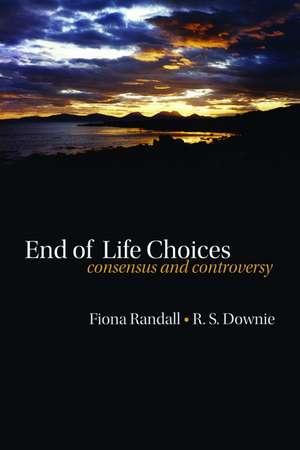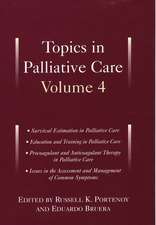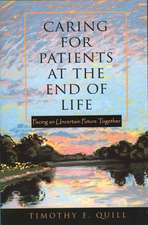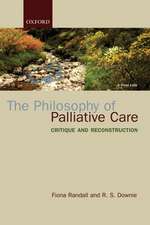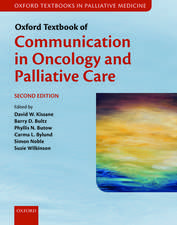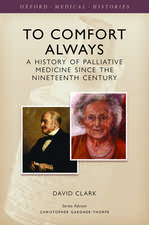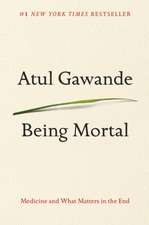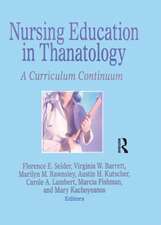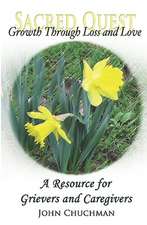End of life choices: Consensus and controversy
Autor Fiona Randall, Robin Downieen Limba Engleză Paperback – 8 oct 2009
Preț: 491.46 lei
Preț vechi: 679.78 lei
-28% Nou
Puncte Express: 737
Preț estimativ în valută:
94.04€ • 98.18$ • 77.83£
94.04€ • 98.18$ • 77.83£
Carte tipărită la comandă
Livrare economică 25-31 martie
Preluare comenzi: 021 569.72.76
Specificații
ISBN-13: 9780199547333
ISBN-10: 0199547335
Pagini: 240
Ilustrații: None
Dimensiuni: 156 x 234 x 14 mm
Greutate: 0.3 kg
Editura: OUP OXFORD
Colecția OUP Oxford
Locul publicării:Oxford, United Kingdom
ISBN-10: 0199547335
Pagini: 240
Ilustrații: None
Dimensiuni: 156 x 234 x 14 mm
Greutate: 0.3 kg
Editura: OUP OXFORD
Colecția OUP Oxford
Locul publicării:Oxford, United Kingdom
Recenzii
This book was a pleasure to read. As in their previous volumes, Randall and Downie have the ability to write clearly and to develop arguments that are logical and transparent, all of which is a refreshing departure from a lot of the stuff published on euthanasia and physician-assisted suicide ... The material in this book is well-presented and articulate. If you are going to delve into these matters only once this year, this should be the book.
A comprehensive exploration of the moral, ethical and medico-legal issues associated with palliative care. It is thought-provoking and provides guidance for many of the problems with which health professionals are faced in their daily work. At £29.95, this is an affordable book which is relevant to anyone caring for patients in the terminal phase of their illness.
A comprehensive exploration of the moral, ethical and medico-legal issues associated with palliative care. It is thought-provoking and provides guidance for many of the problems with which health professionals are faced in their daily work. At £29.95, this is an affordable book which is relevant to anyone caring for patients in the terminal phase of their illness.
Notă biografică
Having trained in palliative medicine at St Christopher's Hospice, London, under the leadership of Dame Cicely Saunders, Fiona Randall has been a consultant in palliative medicine since 1982. She has a special interest and academic background in health care ethics, and a philosophy PhD. Publications include 'Palliative Care Ethics' and 'The Philosophy of Palliative Care: critique and reconstruction', both Oxford University Press. She has served on the BMA Ethics Committee, and represented the Association for Palliative Medicine in consultations on the Mental Capacity Act and its Code of Practice. She has been involved in producing national guidance on advance care planning, and has given evidence to two House of Lords Select Committees on euthanasia. She serves on her Acute Hospital Clinical Ethics Committee, and teaches nationally and internationally on ethical issues in end of life care.Robin Downie was educated at the Universities of Glasgow and Oxford. Before moving into university teaching he was a Russian interpreter in the Army. He has been a member of Government and professional committees concerned with ethical issues, such as the BMA Ethics Committee and Government Committees on xenotransplantation and genetics.In addition to teaching and writing on topics in moral and political philosophy and the philosophy of science he was involved in teaching ethics to undergraduate and postgraduate medical, dental and nursing students and practitioners. Along with Sir Kenneth Calman (formerly Chief Medical Officer, UK) he began the movement now known as the 'medical humanities' i.e. the use of literature and other arts and humanities in the education of health care professionals. In particular, this way of teaching bioethics takes professionals beyond regulations, widens their perceptions of practice, and affects attitudes to patients.
